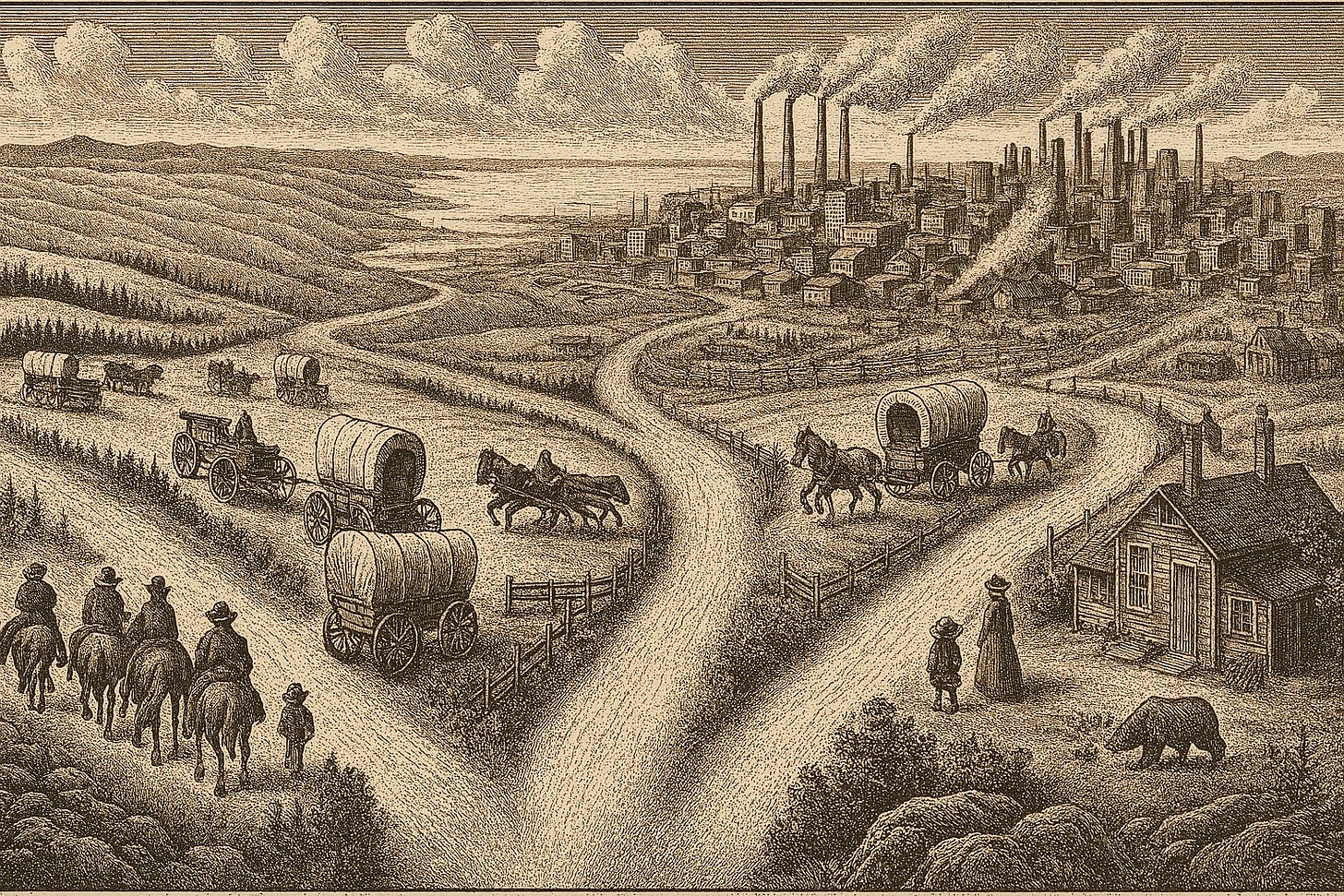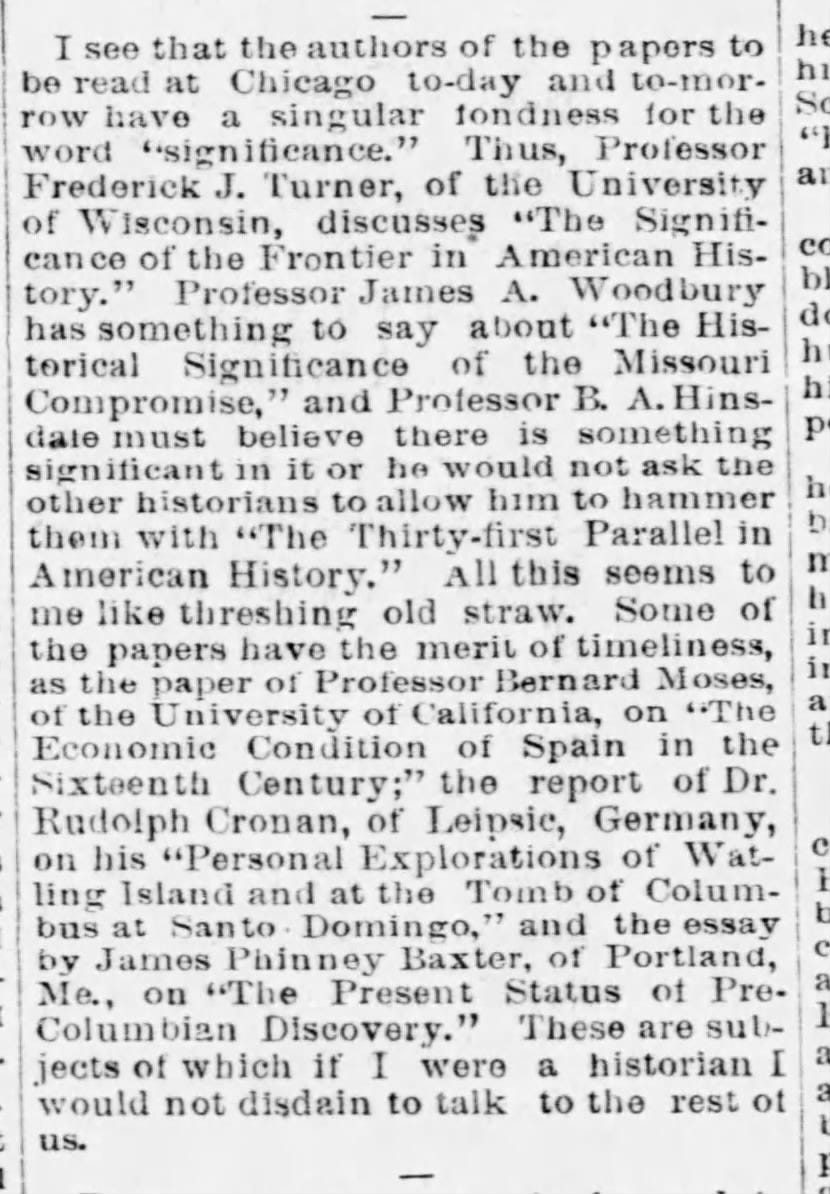Two Interpretations of American History
Part 3: The Attack On Leviathan
As a Viking ship from Norway approached, crowds watched under the weight of the July sun. The White City seemed hammered by Thor himself. Later that evening, the World’s Congress of Historians and Historical Students Evening Session began at 8 p.m. in Hall 3 of the newly constructed World’s Congress Auxiliary Building (Art Institute of Chicago). The last speaker of the session rose to deliver his paper. Frederick Jackson Turner read “The Significance of the Frontier in American History.”1 Twenty-eight days later, in Campbellsville, Tennessee, Donald Davidson was born.
In 1933, The Hound and Horn published Davidson's “Sectionalism in the United States,” which championed sectionalism against a homogenized American identity. The H&H essay was the seed that ultimately grew into The Attack on Leviathan: Regionalism and Nationalism in the United States, especially the chapter under consideration here: “Two Interpretations of American History”.
The key essays are “Two Interpretations of American History” and “Federation or Disunion.” The former is at once a brilliant summary and adaptation of Frederick Jackson Turner’s view of the nature of the sections and a searching criticism of Charles A. Beard. After applying to the present situation Turner's belief in the reality and permanence of regional differentiations, Mr. Davidson develops at length, both here and in “Federation or Disunion,” his leading idea of “sectional imperialism.” - Allen Tate2
An odd story lingers around Allen Tate and this essay, one that doesn't fit neatly with his words above. Tate, then the magazine’s Southern editor, wrote co-editor Bernard Bandler, that he should think twice before asking Davidson to write for H&H. Tate described Davidson as a fervent literalist and defender of the South but the least clear-headed thinker in Tennessee, unlikely to deliver a general piece needed to explore sectionalism in depth.3 Yet, here I am in the year of our Lord 2024, still reading Davidson, and so can you. The links to both essays are above.
“Men in the past were often parochial in space, but the dominant men of our age are parochial in time. They feel for the past a contempt that it does not deserve, and for the present a respect that it deserves still less.” - Bertrand Russell4
Down the Rabbit Hole
Billington and others remark on the insignificance of Turner’s paper at the time. I found this clipping pretty darn funny.
I also did an unscientific experiment (full-text search on Internet Archive) for the papers presented the same night as Turner’s.
The results:
13,256 results: "Significance of the Frontier in American History"
373 results: "Historical Significance of the Missouri Compromise"
6 results: “Thirty-first Parallel in American History”
129 results: "Economic Condition of Spain in the Sixteenth Century"
0 results: "Personal Explorations of Watling Island"
98 results: “Present Status of Pre-Columbian Discovery”
Further Reading
I could go on and on posting PDFs, but the following are a sampling of a few keyword search results from my drive:
References on the Significance of the Frontier in American History by Everett Eugene Edwards
Related:
Billington, Ray Allen. Frederick Jackson Turner: Historian, Scholar, Teacher. New York: Oxford University Press, 1973. Also of note, the mention of “eastern dominance” beginning at the bottom of pg 111, would most definitely resonate with Davidson as he discusses it throughout his work.
Allen Tate. “Critical Regionalism.” The News And Observer 13 Mar 1938, Sun, Page 29.
The Southern Agrarians and the New Deal: Essays After I'll Take My Stand. Southern Texts Society, University Press of Virginia, 2001.
Davidson’s “Sectionalism in the United States” quoted from Bertrand Russell, The Scientific Outlook (Glencoe, Ill., 1931), 267.










Glad to see Fletcher Melvin Green there. I have his "Democracy in the Old South" which is well worth the acquisition.
He's one of the Tall Men.